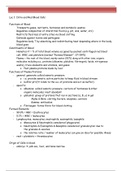Summary
PSL301 Blood Summary Notes
- Course
- PSL301 (PSL300)
- Institution
- University Of Toronto (U Of T )
Complete and in-depth Notes for PSL300 for EXAM prep. Kevin has combined notes from his peers and his own work to provide the most complete and comprehensive study guide for all types of students. He has achieved an overall cumulative GPA of 3.95 during his undergrad at the University of Toronto St...
[Show more]



